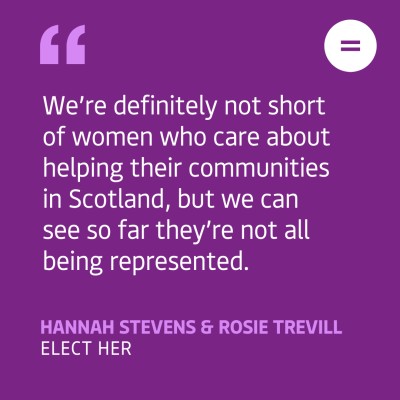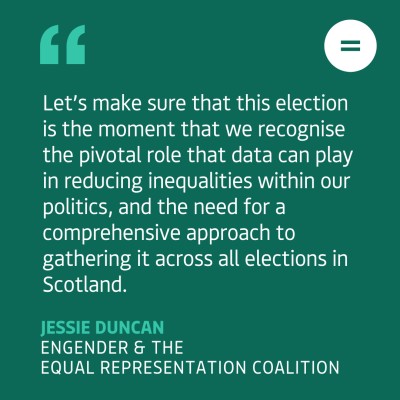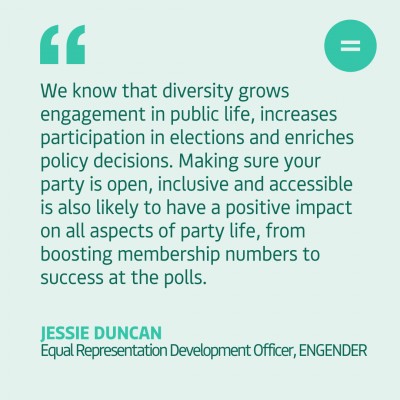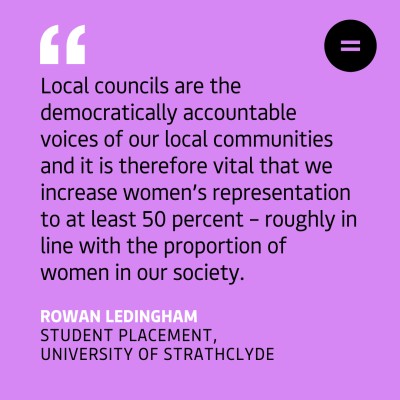Engender blog
GUEST POST: Supporting women to stand for political office

Between now and the local elections on May 5th, we will be publishing a series of blogs from the Equal Representation Coalition. They’ll be taking a look at the state of equality in our politics at the moment, discussing their work in tackle barriers to participation, and will be exploring the crucial role that accurate data plays in achieving equal representation in our councils and parliaments and why we need more of it.
In this post, Hannah Stevens, Chief Executive, and Rosie Trevill, Community and Communications Officer at Elect Her discuss their work supporting women to get involved and stay involved in politics - and why understanding whose voices are missing is essential to creating solutions to women’s underrepresentation in councils and parliaments.
Elect Her is a tiny but mighty organisation that works to motivate, support and equip women in all their diversity to stand for elected office in all spheres of government, providing them with the knowledge, confidence, and skills they need on their journey.  Elect Her is committed to creating safe spaces for women to explore their futures as leaders, legislators, and champions of Scotland’s political governance, nurturing an intersectional community for women in Scotland in the process.
Just 29% of the current cohort of councillors in Scotland are women, although women make up over 50% of the population. It isn't a true democracy until the full breadth of our society is represented in local, devolved and national governments.
Research published last year by the global Institute for Women's Leadership at King's College confirmed that when “women are able to exercise political leadership, there are gains not just for women and girls but for the whole of society.”  It’s in everyone’s interests to ensure that women are being selected and elected in equal numbers to men. We hope we will see an increase in the percentage of women in local government after May’s elections, but stories of many female councillors standing down after just one term sadly does not fill us with hope that the numbers will improve in the substantial way that they need to.
We are currently providing support to 57 women from across Scotland who are preparing to be candidates in the upcoming local elections. We’re supporting women from all political parties, and none, who are committed to having their voices heard in local decision making. We’ve provided campaigning toolkits, skills based workshops, peer support and access to funding opportunities to support these women in the next and vital chapter of their journey into political office. We are cheering them on as they take on this tough challenge and we want to see them thrive through their campaigns and once elected.
But it is hard work. 
We hope that the women elected in May find themselves welcomed into modernised local councils with cultures committed to ensuring women feel able to voice their ideas. There are a number of ways local councils can ensure accessibility and inclusion for all women, including:
- Maintaining a level of virtual access to council meetings;
- Introducing formal parental leave; 
- Introducing work and travel policies that consider caring responsibilities;
- Tackling culture that enables sexist, racist, ableist and homophobic attitudes to persist;
- Creating non-aggressive spaces. 
But we still need more women to be stepping forward for the role whilst that cultural transformation is happening, so of course it is a long-term project. It’s a long-term project worth committing towards however, because when women step forward and encourage these changes, it’ll benefit women for generations to come.
We need reliable and consistent data about who is stepping forward as candidates, not just those elected, so that we can identify - more importantly - who isn't coming forward. We’re definitely not short of women who care about helping their communities in Scotland, but we can see so far they’re not all being represented.
We need a wide range of policies and initiatives from national and devolved governments, local councils, civil society groups like ours and political parties to ensure that the very best people with the widest variety of lived experience see a political future as an appealing and positive way to contribute to their communities. These policies and initiatives can’t be adequately designed until we have a clearer idea about who is missing from our political representation. Data leads to transparency in politics.
From the thousands of conversations that we have facilitated through our live and online workshops, events and training programmes, we hear the voices and needs of women and design our programmes in response to those conversations. We want to provide space for women across Scotland to learn more about their democratic rights, how they can join the conversation and make plans for their own participation. Our programme of support demystifies politics and political processes, so you can find out what a local council actually does, how to join a political party, or how to stand as an MSP.  Our support continues from the very beginning of your journey in understanding what politics is, right through to getting selected and elected; we’ll be right behind you along the way. Our support is a mixture of live online workshops, so you can build a supportive network of women also on their political journey, as well as self-paced online learning resources, so you can fit the work into your busy schedule. What’s more, everything we provide is absolutely free. 
We welcome any woman in Scotland who is interested in exploring their own political future, to join us to learn more about how they can contribute to politics in Scotland. Find out more on our website here.
GUEST POST: Why we need diverse representation now
Between now and the local elections on May 5th, we will be publishing a series of blogs from the Equal Representation Coalition. They’ll be taking a look at the state of equality in our politics at the moment, discussing their work in tackle barriers to participation, and will be exploring the crucial role that accurate data plays in achieving equal representation in our councils and parliaments and why we need more of it.
Here, Junaid Ashraf, Community Engagement Officer at CEMVO Scotland takes a look at some of the barriers faced by ethnic minority people entering politics, how these contribute to persistent underrepresentation in our councils and parliaments, and why it’s high time for change.
We understand now that creating a diverse representative body can have a net positive impact on our lives as we seek to ensure that all experiences of Scotland are represented where the levers of power lie. Unfortunately, while we as a society might understand this, achieving it in reality is a much more difficult task, requiring decisive action from those already in power - including from councils, parliament and political parties.
Over the last 5 years, there has only been between 9 to 17 ethnic minority councillors representing Scotland at a local authority level. That is less than 1.5 % of the entire cohort of councillors elected across the country, or to put in more shocking terms, there is only 1 ethnic minority councillor for every 2 councils in Scotland.
We know that there are many structural and cultural barriers which ethnic minority people face at all levels of political involvement, from the point of joining parties to gaining nominations, to becoming a candidate and even once successfully elected as a councillor, MSP or MP. The fact is that minority ethnic people entering politics are contending with long history of exclusion from public life. The default idea in our society of politicians as white, wealthy, older men is deep rooted and remains a barrier for those who do not fit this outdated image. This can play out in the minds of the electorate when they go to the polls, and also has shaped the way that our political institutions are set up and operate. This means that our institutions are often rigid and hostile to new perspectives, and to the change that they have the potential to bring about. We also recognise that abuse (online and offline) is a major deterrent to people who might seek public office, and we know that those from ethnic minority communities in political spaces are at an increased risk of receiving this. These are some of the factors that result in the extreme underrepresentation that we see.
These statistics have far more negative reaching impacts than simply the outlook of our local authority chambers. As a consequence of this, local authorities across Scotland also have a limited understanding of tackling ethnic minority issues relating to housing, education, welfare, public sector employment and a whole host of additional engagement issues with their local communities. For example, as there is a lack of diversity within the council chamber, minority ethnic led community groups feel disenfranchised to engage with their local representatives. This silences their voice locally and impacts their ability to apply for crucial local funding as they are unaware of applications, or the local authority does not value their work even if an application is made due to a lack of sustained interaction.
On May 5th 2022, the chance to diversify our local chambers of representation will present itself again. But quite often, the electorate is not met with the ability to elect politicians who will be able to authentically represent their experience as a person. It seems like the council elections will repeat this pattern and we will have missed another opportunity to increase diverse representation. This year many wards across Scotland will again not have the chance to vote for an ethnic minority candidate on their ballot.
CEMVO Scotland is proud to play a part in the Equal Representation Coalition, and supports the call to encourage political parties to publish diversity data on their candidates and successfully elected councillors. It is only through having a clear picture of the political landscape can we then work as third sector organisations, government and political parties to ensure that we progress the healthiness of our democracy to be inclusive for all for years to come.
To learn more about CEMVO and the work they do supporting the ethnic minority voluntary sector and its communities in Scotland, check out their website here.
GUEST POST: Women and Local Council Elections in Scotland
Today we're publishing the first in a series of blogs from the current student placements Engender is hosting from the University of Strathclyde Applied Gender Studies and Research Methods course.
In this post, Rowan discusses women's representation in local councils, and will be researching about why some women that were previously elected are not re-standing in the local council elections in May 2022. You can read Rowan's second blog here.
When I decided to apply to the Applied Gender Studies masters at Strathclyde, the prospect of a research placement at Engender was a big factor in my decision. Naturally, I am now thrilled to be a part of this organisation’s research into the experiences of female local councillors in Scotland and the reasons behind some women’s decision to stand down in the May 2022 elections.
The overrepresentation of men in positions of power in Scotland was made evident in Engender’s 2020 Sex & Power Report. More specifically, we saw that women make up just 29 percent of elected councillors at local authority level. Unequal gender representation in local councils reflects and compounds inequality in society, since we know the narrower the range of backgrounds, the narrower the range of experiences that are brought to the fore in political decision making. Local councils are the democratically accountable voices of our local communities and it is therefore vital that we increase women’s representation to at least 50 percent – roughly in line with the proportion of women in our society. On a more positive note, we now have a record share of MSPs, 45 percent, who identify as female. We are hopeful that similar progress will be made in the local council elections in May.
It is worth noting that there are currently no requirements to collect or publish information on the equality characteristics of candidates for elections in Scotland. This is because the UK Government did not enact Section 106 of the Equality Act to require that all parties are legally responsible to publish demographic data on their candidates ahead of any election. When this is combined with the paucity of information available on independent candidates, understanding the true diversity of candidates in our local authorities is somewhat challenging.
At the end of 2021, the Scottish Government set out plans to collect data on the diversity of candidates and elected representatives in the May 2022 elections. A questionnaire was designed to ask candidates questions about the protected characteristics set out in the Equality Act and to capture additional information on the socio-economic status, previous parliamentary experience and caring responsibilities of candidates. However, the questionnaire did not include questions exploring the experiences of candidates and any barriers they faced in seeking to become or while serving as a councillor.
The COSLA Barriers to Elected Office Special Interest Group has undertaken work to increase the diversity of local councillors and address the barriers to elected office. There are a number of key themes that emerge from their research:
- Remuneration. Councillors are unfairly compensated for the responsibility and workload of the modern councillor.
- Working hours. Councillors work full-time equivalent hours, making it difficult to maintain secondary employment.
- Working practices. Councillors face challenges when balancing other caring responsibilities with the role.
- Support. There is often a lack of support services from political parties and especially for independent councillors.
- Culture. Councillors are at greater risk of scrutiny, harassment and abuse than the average citizen.
Taking account of gaps in the current research and the barriers to elected office highlighted by COSLA, Engender’s research will focus on why female councillors are choosing to stand down from their position in the May 2022 elections. The hope is that this research will provide a more complete picture of women’s experiences in local government, the reasons why they choose to leave their role and the possible barriers to women’s equal representation in local councils.
In order to meet my research aim, I will interview female councillors from both rural and urban authorities to discuss their experiences and explore the reasons why they are not seeking re-election. I aim to interview 10 councillors from a sample of 4 or 5 different local authorities. Attempts will be made to achieve an acceptable geographical spread within the sample. Data from the interviews will be presented in a final report, and patterns and themes that emerge from the data will be explored and comparisons drawn between urban and rural authorities, as well as between independent and party-affiliated councillors. In addition, the report will present statistics and a breakdown of the gender representation of the candidates from the research sample.
I look forward to exploring this important area of research with Engender over the next few months.
Data & Equality in Politics
Between now and the local elections on May 5th, we will be publishing a series of blogs from the Equal Representation Coalition. They’ll be taking a look at the state of equality in our politics at the moment, discussing their work in tackle barriers to participation, and will be exploring the crucial role that accurate data plays in achieving equal representation in our councils and parliaments and why we need more of it. Here, Engender’s Equal Representation Development Officer Jessie Duncan is kicking us off with an introduction to some of the key issues and why gathering data is vital to achieving equal representation.

The Equal Representation Coalition brings together organisations from across the equalities sector in Scotland with shared goals around improving access to politics for people from underrepresented groups (with particular attention to women, minority ethnic people, LGBTI+ people and disabled people) in order to achieve equal representation in our councils and parliaments. Today the Equal Representation Coalition includes Engender, The Equality Network, CEMVO, Stonewall Scotland, Women 50:50, CRER, BEMIS, Inclusion Scotland, YWCA Scotland and ElectHer. The Coalition meets regularly to discuss their own work as well as current issues relating to equality in civic and political participation - and also to share learning and explore opportunities for collaboration. Notable to date has been the creation by some Coalition members of the Equal Representation in Politics Toolkit, a set of resources aimed at political parties to improve internal practice on equality, diversity and inclusion.
Supporting Political Parties to achieve Equal Representation in Politics
Political parties have a unique role in achieving equal representation at all levels of government. Engender have been working with partners on the Equal Representation Coalition to develop the Equal Representation in Politics Toolkit, a set of resources to support political parties to assess their current practice and to become as inclusive as possible. The ultimate goal is to see more women, minority ethnic, LGBTI and disabled people get involved, become candidates and get elected. Here, our Equal Representation Development Officer Jessie Duncan writes about representation in Scottish politics and how the Toolkit can support parties to be proactive within their own structures to increase diverse representation.

When it was formed in 1999, Holyrood raised the bar for gender equality in political representation in Scotland (and the UK) with women making up 37.2% of MSPs, reaching a high of 39.5% in 2003. Then followed three successive elections of decline and stagnation, with figures hovering in the 33-35% range.
The early promise of Holyrood as a place where politics can better represent the communities it serves feels alive again after the 2021 election. Significant strides have been made in some areas, with women making up a record 45% of MSPs including the first two women of colour and the first permanent wheelchair user. These are gains to be celebrated, however they did not happen by accident.
Downloads
 Engender Briefing: Pension Credit Entitlement Changes
From 15 May 2019, new changes will be introduced which will require couples where one partner has reached state pension age and one has not (‘mixed age couples’) to claim universal credit (UC) instead of Pension Credit.
Engender Briefing: Pension Credit Entitlement Changes
From 15 May 2019, new changes will be introduced which will require couples where one partner has reached state pension age and one has not (‘mixed age couples’) to claim universal credit (UC) instead of Pension Credit.
 Engender Parliamentary Briefing: Condemnation of Misogyny, Racism, Harassment and Sexism
Engender welcomes this Scottish Parliament Debate on Condemnation of Misogyny, Racism, Harassment and Sexism and the opportunity to raise awareness of the ways in which women in Scotland’s inequality contributes to gender-based violence.
Engender Parliamentary Briefing: Condemnation of Misogyny, Racism, Harassment and Sexism
Engender welcomes this Scottish Parliament Debate on Condemnation of Misogyny, Racism, Harassment and Sexism and the opportunity to raise awareness of the ways in which women in Scotland’s inequality contributes to gender-based violence.
 Gender Matters in Social Security: Individual Payments of Universal Credit
A paper calling on the Scottish Government to automatically split payments of Universal Credit between couples, once this power is devolved to the Scottish Parliament.
Gender Matters in Social Security: Individual Payments of Universal Credit
A paper calling on the Scottish Government to automatically split payments of Universal Credit between couples, once this power is devolved to the Scottish Parliament.
 Gender Matters Manifesto: Twenty for 2016
This manifesto sets out measures that, with political will, can be taken over the next parliamentary term in pursuit of these goals.
Gender Matters Manifesto: Twenty for 2016
This manifesto sets out measures that, with political will, can be taken over the next parliamentary term in pursuit of these goals.
 Scottish NGO Briefing for UN Special Rapporteur on Violence Against Women
Joint briefing paper for the UN Rapporteur on Violence Against Women.
Scottish NGO Briefing for UN Special Rapporteur on Violence Against Women
Joint briefing paper for the UN Rapporteur on Violence Against Women.

Newsletter
Sign up to receive our newsletter here:
Sign up to our mailing list
Receive key feminist updates direct to your inbox:
![A bright teal graphic with text: As a consequence of this [underrepresentation], local authorities across Scotland also have a limited understanding of tackling ethnic minority issues relating to housing, education, welfare, public sector employment and a whole host of additional engagement issues with their local communities.](/siteimages/Blog/resized/equal-rep-blog-cemvo-400.png)
